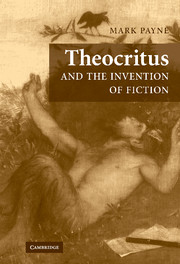1 - The pleasures of the imaginary
Published online by Cambridge University Press: 22 September 2009
Summary
The ancient scholia on Theocritus consider Idyll 1 the poem most worthy of standing at the head of the collection. It is, they claim, composed with greater skill and charm than the others, and they cite Pindar on the appropriateness of its coming first as a consequence: “At the beginning of a work one ought to place a gleaming front.” They note next that the poem has the form of a dramatic exchange by its characters in which the poet himself does not feature. It is a dialogue between Thyrsis, a shepherd and singer, and an unnamed goatherd who is also a syrinx player. An introductory conversation between the two (1–14) sets the scene of their encounter and is followed by a long speech by the goatherd (15–63), in which he describes a decorated bowl or kissubion (27–60) that he promises to give to Thyrsis if the latter will sing “The Sorrows of Daphnis” for him. Thyrsis responds by performing the song (64–145), and the goatherd greets his performance with enthusiastic admiration when it is over (146–52). For the scholia, then, part of the poem's appeal, its charm, or charis, is the skill with which these diverse components are interwoven; they speak of the poem as being particularly well put together, even though the poet's own voice does not appear in it as a unifying force.
- Type
- Chapter
- Information
- Theocritus and the Invention of Fiction , pp. 24 - 48Publisher: Cambridge University PressPrint publication year: 2007
- 1
- Cited by



